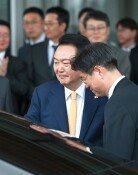Declaring an end to the Korean War won’t bring peace
Declaring an end to the Korean War won’t bring peace
Posted June. 27, 2020 08:12,
Updated June. 27, 2020 08:13
U.S. Secretary of Defense Mark Esper said he is keeping an eye on North Korea’s recent moves that are becoming a significant threat and the North will not be compensated for bad behaviors. In an exclusive interview with The Dong-A Ilbo Wednesday, Esper said strengthening alliance with South Korea includes efforts to achieve the “Final Fully Verifiable Denuclearization (FFVD)” of North Korea and eternal peace on the Korean Peninsula.
While defining North Korea as an “existing threat,” Esper stressed that President Donald Trump’s North Korea policy is about using national capability in all areas to achieve complete denuclearization of North Korea. He added that North Korea should take the chance of a lifetime since the U.S. is committed to diplomatic efforts, making it clear that denuclearization is the only way for North Korea to overcome economic difficulties and revive the country.
Recently, there has been no mention of denuclearization from the South Korean government. President Moon Jae-in called for an end to the state of war during his speech commemorating the 70th anniversary of the Korean War on Thursday but did not mention denuclearization on the Korean Peninsula. After the recent provocation by North Korea, there have been calls by the South Korean administration and the ruling party to declare a formal end to the Korean War and ease sanctions against North Korea.
Declaring an end to the state of war is a stepping stone towards achieving a complete peace on the Korean Peninsula. The heads of two Koreas agreed to declare an end to the Korean War during the 2018 inter-Korean summit at Panmunjom but denuclearization was a prerequisite as was stated in the Panmunjom Declaration. Mentioning a rewardㅡdeclaring an end to the Warㅡfirst when there are no hopes of denuclearization talks will only make it hard to denuclearize the Korean Peninsula.
North Korea’s Foreign Ministry expressed its ambition for nuclear development on Thursday by saying it will continue to strengthen its nuclear development to deter the U.S. nuclear threat. By blowing up the joint liaison office, Pyongyang is putting Seoul under pressure to persuade Washington to ease sanctions against North Korea while leaving military option open for South Korea. It is unreasonable for Seoul to reward North Korea for the same action the U.S. said it will not compensate for. The peace will not automatically come on the Korean Peninsula even if the two Koreas declare an end to the War. Inter-Korean relations have deteriorated just because the North has refused to denuclearize, not because there are not enough agreements or declarations between the two Koreas.







